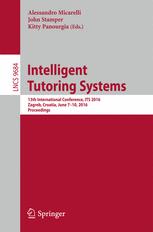

Most ebook files are in PDF format, so you can easily read them using various software such as Foxit Reader or directly on the Google Chrome browser.
Some ebook files are released by publishers in other formats such as .awz, .mobi, .epub, .fb2, etc. You may need to install specific software to read these formats on mobile/PC, such as Calibre.
Please read the tutorial at this link: https://ebookbell.com/faq
We offer FREE conversion to the popular formats you request; however, this may take some time. Therefore, right after payment, please email us, and we will try to provide the service as quickly as possible.
For some exceptional file formats or broken links (if any), please refrain from opening any disputes. Instead, email us first, and we will try to assist within a maximum of 6 hours.
EbookBell Team

4.0
56 reviewsThis book constitutes the refereed proceedings of the 13th International Conference on Intelligent Tutoring Systems, ITS 2016, held in Zagreb, Croatia, in June 2016.
The 20 revised full papers, 32 short papers, 35 posters, and 7 young researchers’ track papers presented in this volume were carefully reviewed and selected from 147submissions. The specific theme of the ITS 2016 conference is "Adaptive Learning in Real World Contexts".
ITS 2016 covers a wide range of topics such as: intelligent tutoring; informal learning environments, learning as a side effect of interactions; collaborative and group learning, communities of practice and social networks; simulation-based learning and serious games; dialogue and discourse during learning interactions; co-adaptation between technologies and human learning; ubiquitous and mobile learning environments; empirical studies of learning with technologies, understanding human learning on the web; adaptive support for learning, models of learners, diagnosis and feedback; modeling of motivation, metacognition, and affect aspects of learning; recommender systems for learning; virtual pedagogical agents and learning companions; ontological modeling, semantic web technologies and standards for learning; multi-agent and service oriented architectures for learning and tutoring environments; educational exploitation of data mining and machine learning techniques; instructional design principles or design patterns for educational environments; authoring tools and development methodologies for advanced learning technologies; domain-specific learning technologies, e.g. language, mathematics, reading, science, medicine, military, and industry; non conventional interactions between artificial intelligence and human learning; and privacy and security in e-learning environments.